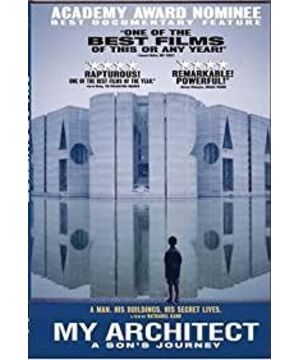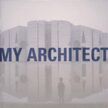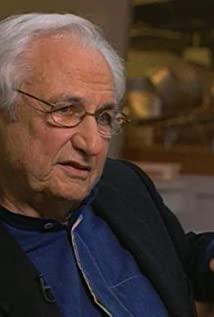The design attitude itself is still the love of life and the thinking about life.
He brought tears to my eyes.
Louis Kahn. He died alone at the train station and had the address on his passport obliterated. Such a truly homeless man, despite the love of three women he has.
Kang is essentially a wanderer at heart.
When I wrote this sentence, I did not feel compassion for the heavens and the people, but I deeply felt a call and helplessness from fate, and was deeply moved by him.
■ Regarding the search for
a designer from the perspective of social attributes, I understand Kang's life in the studio all night long with empathy. It is not so much a life as it is an exploratory love and passion. Before the age of fifty-one, he had been searching for his own existence. And then I was fortunate enough to meet it. Divinity and humanity at one point made a common promise, not glory, but silence and light.
I have always believed that the encounter between the creator and the inspiration is a matter destined by God to go with the flow. It's not about time, it's about eternity.
Actually, I don't want to say too much about Kang's work here, many people know it. Just like the existence of the plaza leading to the endless sky at Sark College in California, I just want to say that in my opinion, each of Kang's works is a newborn baby, but all of them carry the memory of their origin and continue. new life. So much so that the Bangladeshi parliament building he designed was not bombed by enemy pilots during Bangladesh's war of independence with Pakistan in 1971. why? Because they thought it was a monument.
Kang once gave an interesting speech in a class at the University of Pennsylvania.
To express is to drive. If you want to make something of value, you have to consult with nature. Design emerges from it.
For example, if you want to use bricks, you ask the bricks, "What do you want, bricks?"
The bricks will say to you, "I'm going to be an arch."
If you say to the bricks, "You know, arches are expensive. I can make a concrete lintel over you. What do you think, brick Brick?"
said Brick, "I'm going to be an arch." The
students burst into laughter, and Kang continued, "It's important, you know, you respect the materials you use. Can't be casual, there's a lot of materials anyway. It can be used. We can use this, we can use that. It's not right. You have to respect the brick to use it. It should be honored, not perfunctory."
This also made me laugh, He expressed his respect for life with such understated humorous language.
A charming person, often so casually revealing his charm.
In Kang's mind, architecture and all things in the world have their own desire to exist. Influenced by Schopenhauer's philosophy, he has been asking questions about the nature of space. "So I believe that architects somehow have to go back and listen to the original voice," he said. This original voice, the cultural source from which the building and its spaces are made, is when people first put up a shack. hazy perception.
Therefore, he stood on every piece of unconstructed land, realized the needs of the building itself, and used his own design to restore the building to the land it should belong to, and let life and life start a dialogue. That's why his buildings are imbued with historical origins, meditation and contemplation, silence and light.
For others, it may be a work of art with spiritual qualities, born in the hands of a great artist.
But for Kahn himself, architecture is built on belief, and architecture itself is belief.
As described by Doshi, the Indian architect who invited Kang to Ahmedabad to design the Indian Institute of Management,
"You rarely meet someone who presents matter in a spiritual way. He is very concerned with that sense of nothingness, very concerned with silence, very concerned with mysterious light. This is not a conventional statement, it is not a conventional elaboration, which is exactly what we What fascinates him is what he is willing to discuss. When someone understands this, he must not be an ordinary person, he must have an enlightened soul, we call him a teacher, and we call him a practitioner.”
“So for us Say, he started from here, and my feeling is that he really reached a higher state, a state of enlightenment. In India, we often say that no one dies, they go to another world. That It's a kind of samsara. Disillusionment of the body, immortality of the soul, immortality of consciousness. And Lou is in that state, beyond consciousness. For him, everything is alive, everything is in this kind of samsara. If you go into silence , you will hear him. Absolutely, you will hear his voice."
So, about the end of the search, Kang gave us an answer, respecting the origin of life, from here, to here.
■About the love
of Aikang and the three women, it is actually a privacy that he does not want to talk about. And the architects around him rarely heard his description of the family, and some didn't even know he had a family. Because he spends most of his time working, creating, and traveling. This great architectural poet, in terms of human emotion, is real and unrestrained, like an immature child who lacks love for his family. It is difficult for us to criticize his deviation in social attributes, but we cannot doubt his sincerity at all.
Those letters to lovers and children are direct and tender. And his lovers, probably all love his heart and talent. Therefore, in the second half of his "philosophy" life, he can only endure the hardships that women need to endure, but still give him tolerance.
His childhood curiosity made him obsessively go to the fireplace to pick up flaming coals, which resulted in a burn on his face. The mottled face that has been gradually carved over the years is like the hand of God, driving him to focus more on exploring the interior.
nobody is perfect. No one has to be perfect to be perfect.
Incompleteness can also become another kind of perfection.
Therefore, you can't discuss how many buildings he has built in a general sense, and you can't condemn his lack of family warmth in a general sense. Instead, you need to put aside all of this and learn from the architectural life that he has left behind. , in the quiet light falling from the zenith, and in the sound of the flowing water, found his broad and deep love for life.
Regarding the imperfection, adversity or difficulty in life, Kang's attitude is that he never escapes to hide it, but to highlight it and express it, and then it can be resolved and relieved. This is his attitude towards the buildings he designs and his attitude towards his own life.
Like the ethos characteristic of the space of the Salk Institute, which Kang completed at the age of 65. It is empty and vast, and the square without a tree in the center is a vast face that leads straight to the sky. Every scientist here has his own study and can see the Pacific Ocean unobstructed. It is also mottled and simple, just like the wall that naturally produces scars during the construction process, unabashedly expressing such a process of primitive changes in life.
I saw Kang himself in his building.
The Bangladeshi architect Sam Wewes, who worked with Kang, couldn't hold back his excitement and tears when he heard the director say that there are ten minutes left for the Bangladeshi building in this film. He said,
"You can't treat this building like this, it's almost impossible, for a building like ours. Thirty or fifty years ago, there was nothing here, just rice fields. After we invited Lou to come, he Feeling that he had a sense of responsibility, he wanted to be the Moses here, he gave us democracy. He wasn't political, but he actually gave us democratic institutions where we could grow, and that was significant. He It doesn't matter how much money this country has, or if he can finish this building, but somehow, he's done, he's built this. It's the big project he's ever done, right here, the most in the world poor country.”
"So I think, he gave a lot, he spent his life building this building, that's why he was great, and we have to remember him. But he was also a normal person, and his greatness came with his failures in his family life, Nothing can be changed. But I think his son will understand him and not resent him or feel ignored. He does it in a different way, but it takes a long time to understand .Societally looking at his life, he's like a kid, immature at all, he doesn't say no to anything, that's why we have this building today. I don't have any other way to really understand him ," Sam had tears in his eyes at this point.
"But I think he gave us this building, so...we can perceive him forever, so he gave us love. He may not give you the same love, but for us, he gave us That enduring love of all the people. It's important, you have to understand that. His love is huge, he loves everyone, because he loves everyone, and sometimes he can't take care of the people closest to him. To understand him, you have to know this." With those words, Sam burst into tears.
My tears also flowed down. He only cares about pure things, what the land and people need, what lies beyond historical origins, and is willing to give everything for it. So his final fate in the cruel world is physical overdraft, bankruptcy and debt.
But love stayed.
With such love, the light in his heart illuminates his mottled face, making him unique and deeply respected.
With such great love. Only his lovers will give him understanding, tolerance, and endless affection and regretless waiting in the years.
Just like in Maine 25 years after Kang's death, she has gray hair and tears in her eyes, but she has no regrets for the rest of her life, as Harriet, the mother of Nathaniel, the director of this film, and Kang's third lover.
The son asked him, is it not painful for you to experience so much loneliness? Why not find someone else to share your life with?
Harriet replied, I'm a romantic fatalist, and even if someone comes, you know, I'll still be alone...
As for love, it's really not a thing that time passes in loneliness, as long as you think it's worth it.
More fundamentally, love itself is lonely.
■About wandering
He made a small hand-painted book for his son called "The Book of Crazy Ships". There are many kinds of boats drawn on it, a boat made of spoons, a boat made of biscuits, and a boat made of sausages, supported by toothpicks to keep it balanced on the water. At that time, the child did not know that Dad Lou was really going to make a crazy boat.
He really did.
A strange looking ship, like a monster from a Verne novel. It was actually a sea music barge made of steel, which could go to towns all over the world. After the cabin was opened, it was a music stage. The owner, Robert Boudreau, is the captain and bandleader.
When the brilliance of the setting sun penetrated into the cabin through the round holes, it was indescribably wonderful.
When the deck at night turns into a stage for music, the dream seems to come into reality.
When the director told Robert that he was Lou's son, Robert couldn't help but choked up. He remembered Kang and his 6-year-old son and he couldn't help crying, choked and said, you are Lou.
In such tears, people's feelings towards Kang Love. Even after he left, he still left people's love. This is the symbiosis of love.
In my blurry eyes, I could vaguely distinguish the wandering ship carrying Kang's wandering soul. His consciousness resides in every building he designs, lonely and powerful.
And he is such a contradictory person. Worried, but kept walking. The light of the world is waiting for him to capture, the land of the world is waiting for his call, and people all over the world are grateful for his gift, but his heart has no home.
When he died, the address on his passport was painted out.
It wasn't a mystery, Harriet said, and he would definitely do that.
Fortunately, the women he loves are tolerant and full of wisdom.
Wandering and love are actually inseparable.
Anyone who would rather wander around is someone who has deep love in their hearts.
It's just that he hasn't found a place to stay.
Or, his stay was not based on some ordinary locations. May be nothingness, inward, spiritual, endless, beyond consciousness, flowing between his buildings, the opening of another life after the cessation of life.
This is my interpretation of this inner wanderer.
Lou said, how accidental our existences are, really, and how full of influence by circumstance
.
More moved deep in my heart, I want to stop at words.
Over and over again, in the years of my life, above the wasteland, above the prosperity, between the silence and the light, listen to him, feel him.
I wish I could pay tribute to Kang with the love, persistence, serenity, and calmness in my life!
View more about My Architect reviews









